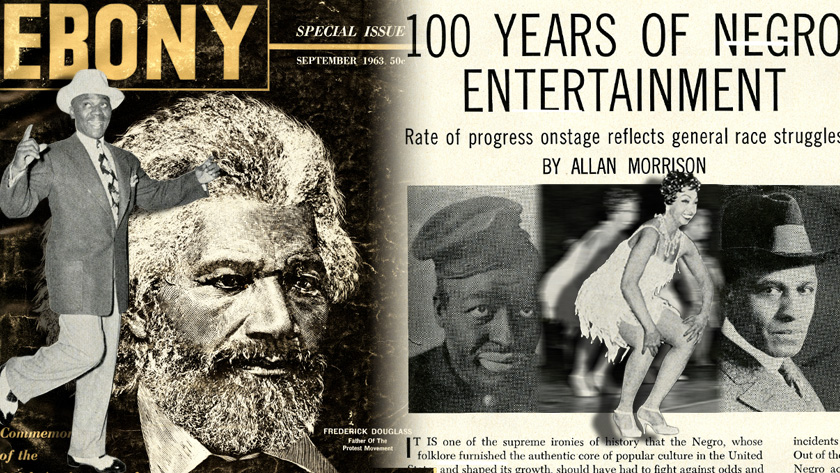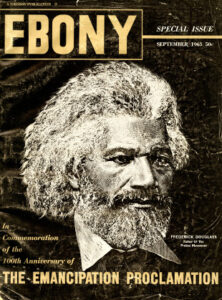
The magazine cover and an article from September 1963's special issue of Ebony.
A View from the Vault: Ebony Magazine Special Edition, 100th Anniversary of the Emancipation Proclamation, September 1963
By Arline Wilson, Special Collections
“A View from the Vault” showcases some of the unique, notable or rare items that are a part of the Special Collections and Museums holdings at the University of Delaware. Each month, we highlight a different work and share interesting facts or intriguing histories about it. If you are interested in seeing any of the materials featured in person or want to learn more about any work showcased in the series, please contact Special Collections and Museums at AskSpec or AskMuseums.

The cover of the September 1963 special issue of Ebony magazine.
Special Issue of Ebony Magazine, September 1963
Littleton and Jane Mitchell Papers
Finding Aid information: MSS 0629, Series I.V.I.B., Box 45, Folder 25
Special Collections, Gift of Philip Vann Mitchell, 2010
This month’s post commemorates the Juneteenth federal holiday. Although it officially became law on January 1, 1863, the Emancipation Proclamation merely marked the legal end of slavery in Southern states. Slavery continued to reign in Confederate-controlled locations, especially in westernmost states. Juneteenth commemorates the end of military efforts to maintain slavery in the U.S., which occurred on June 19, 1865, when General Granger and 2,000 Union soldiers rode into Galveston, Texas, to enforce the Emancipation Proclamation. Juneteenth has long been celebrated and recognized by African Americans as the nation’s second Independence Day, and in 2021, Congress passed the Juneteenth National Independence Day Act, which President Biden signed into law, officially recognizing the day as a federal holiday.
The 1963 anniversary issue of Ebony magazine, the first Black-oriented magazine in the U.S. to attain national circulation, was the largest single issue in the magazine’s history, and it was “devoted to the story of 100 years of hope and struggle that embody the spirit of Juneteenth.” Most notably, Allan Morrison’s article, “100 Years of Negro Entertainment,” provides a fascinating genealogy of Black performing arts in the U.S., detailing historical and social changes that enabled Black participation in American theater. The article traces how race relations over the last century were strongly connected with African Americans’ status as citizens, and how their increased connection to freedom directly correlated to their ability to artistically express themselves.
In addition to offering a smorgasbord of articles tracing various aspects of Black life and culture since emancipation, the 236-page edition serves as a time capsule of African American life and culture in the early 1960s, replete with images of a young Miles Davis and advertisements that tell a history of Black print culture.
